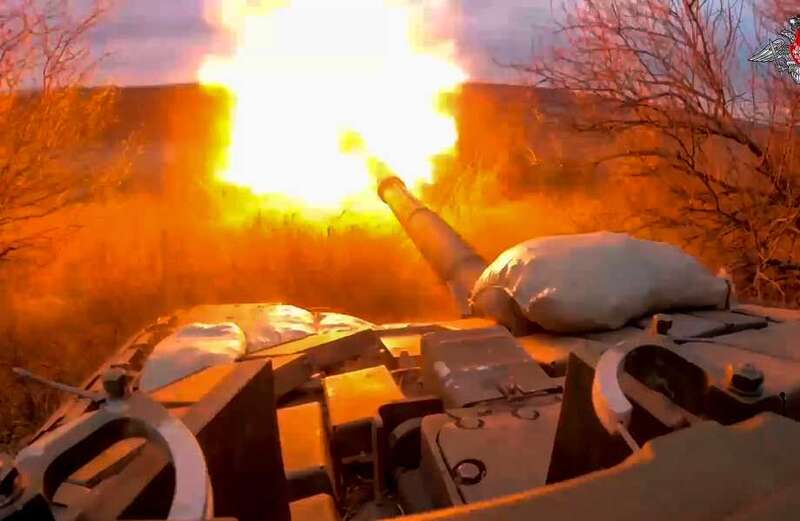KILLER drones have changed land warfare forever, but tanks will always remain king of the battlefield, a retired British general says.
Sir Richard Barrons argued the bloody battles in Ukraine have proved the power of unmanned aerial vessels (UAVs) but tanks are destined to adapt and head into an era of automation.





Speaking on The Sun's World at War, Barrons admired the new capabilities of drones and their armour-blitzing skills - but didn't give any credit to the arguments that tanks will vanish from the battlefield.
The former Joint Forces chief said: "If you're on a battlefield and people are dropping bombs on you, firing artillery at you, using machine guns and mines, you're going to want an armoured vehicle with tracks on it."
He questioned who would want to head into a fight without a big gun, effective sights and easy manoeuvrability over difficult terrain.
 Putin accused of surrounding himself with same 'actors' at series of events
Putin accused of surrounding himself with same 'actors' at series of events
However, Barrons noted that as drones change the course of land warfare, tanks too are being forced to adapt and quickly.
"We're going to see an evolution of armoured vehicles and very soon they will turn up with counter-drone capabilities on them. And it'll all balance again," he said.
Russian already appears to be rising to the challenge with haphazard edits after tanks were spotted hiding underneath armoured mobile sheds to fend off UAV attacks.
The tank is in a state of evolution
General Richard Barrons
Barrons spoke of the "significant effect" first-person-view (FPV) drones have had on the Ukrainian battlefield.
The cheap, kamikaze, tank-blitzing precision weapons have become one of Kyiv's biggest success stories since its military ran perilously short on munitions due to long-stalled Western weapons shipments.
And yet, the retired general noted that FPVs are "not as effective as they sometimes appear".
He said roughly only "1 in 10 drones makes it through the electronic interference".
Barrons also hit back at claims that the UK's Challenger 2 tanks sent to Ukraine had been disappointing at the front.
Instead, he argued that it was likely a case of "inexperienced" Ukrainian crews and difficult terrain.
 Catholics across the world pray for Pope Benedict XVI as his body lies in state
Catholics across the world pray for Pope Benedict XVI as his body lies in state
He conceded that Challenger 2s are old - "a 1990s vintage" - and were always likely to struggle against more modern equipment, but he warned change was coming.
"So the UK is buying the Challenger 3 so that will be more powerful.
"It'll have a different and better gun and upgraded armour and other systems that will protect it against drones. So we should recognise that the tank is in a state of evolution."
However, in the not too distant future, tanks will be automated and unmanned, Barrons said.
"I'd expect them to be lower, faster, cheaper. And of course, if it's a machine, it doesn't need to train like a human.
"So they'll be cheaper to buy, cheaper to operate. You won't care if you lose them."
The urgency is there because of Ukraine, he said, but "you've got to wait for the civil sector to crack it and then pass it across to the military."


For Ukraine, Barrons said what is needed is an "orchestra of raw fusion" was needed to bring together all the best qualities of tanks but also infantry and artillery and air capability.
"It's a blend of those things that makes you effective on the battlefield," he added.
It comes as Ukraine is currently facing down a major new Russian offensive in the Kharkiv region.
Vladimir Putin has massed more than half a million troops on the northeastern front in a bid to overpower Kyiv's stretched defences and battle-weary troops.
Ukraine is desperately trying to hold the line against Russia, which has a significant advantage in manpower and munitions and is pushing their advantage and seizing miles of ground.
The blitz, said to be the first stage of Russia’s summer offensive, is designed to stretch Ukraine’s already outnumbered defenders.
The US has rushed through military aid after news Ukraine's forces were on the retreat and President Volodymyr Zelensky had to postpone all his upcoming foreign trips.
Royal United Services Institute war expert Dr Jack Watling told The Sun that unless Ukraine could muster more troops its prospects were bleak as Russia had “significant numerical superiority”.
Moscow has claimed its forces have pushed deeper into the Kharkiv region and captured the symbolic town of Robotyne - one of the only prizes of Ukraine's muted summer counteroffensive.
Kyiv said the Russian push appeared to have run out of steam on Tuesday — but, in the face of Putin’s 500,000-strong force, warned that could change quickly.









































